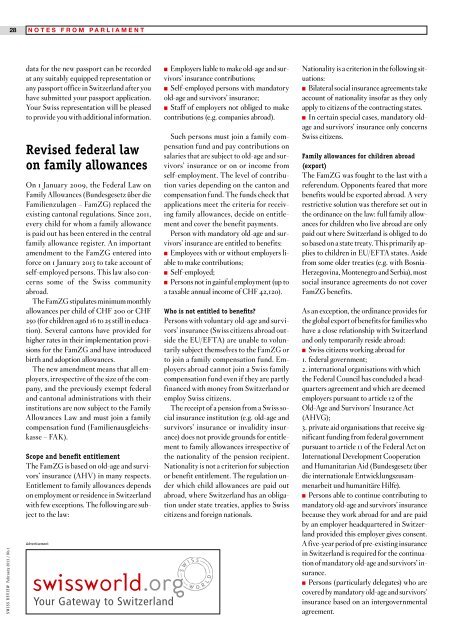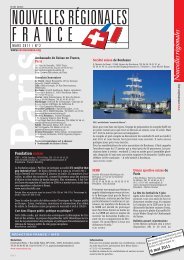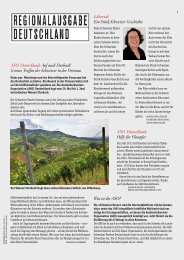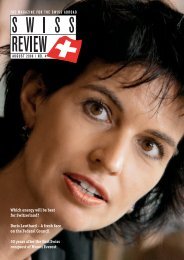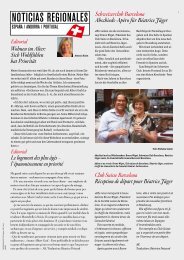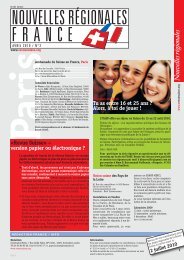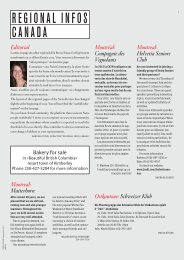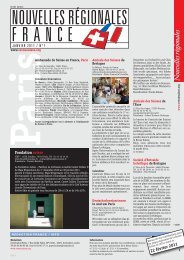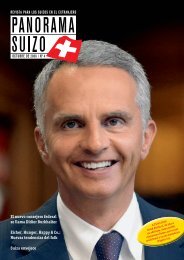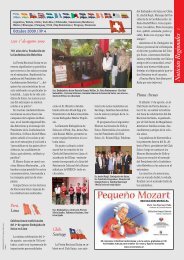Download PDF Swiss Review 1/2013 High Resolution
Download PDF Swiss Review 1/2013 High Resolution
Download PDF Swiss Review 1/2013 High Resolution
You also want an ePaper? Increase the reach of your titles
YUMPU automatically turns print PDFs into web optimized ePapers that Google loves.
28 NOTES FROM PARLIAMENT<br />
<strong>Swiss</strong> <strong>Review</strong> February <strong>2013</strong> / No. 1<br />
data for the new passport can be recorded<br />
at any suitably equipped representation or<br />
any passport office in Switzerland after you<br />
have submitted your passport application.<br />
Your <strong>Swiss</strong> representation will be pleased<br />
to provide you with additional information.<br />
Revised federal law<br />
on family allowances<br />
On 1 January 2009, the Federal Law on<br />
Family Allowances (Bundesgesetz über die<br />
Familienzulagen – FamZG) replaced the<br />
existing cantonal regulations. Since 2011,<br />
every child for whom a family allowance<br />
is paid out has been entered in the central<br />
family allowance register. An important<br />
amendment to the FamZG entered into<br />
force on 1 January <strong>2013</strong> to take account of<br />
self-employed persons. This law also concerns<br />
some of the <strong>Swiss</strong> community<br />
abroad.<br />
The FamZG stipulates minimum monthly<br />
allowances per child of CHF 200 or CHF<br />
250 (for children aged 16 to 25 still in education).<br />
Several cantons have provided for<br />
higher rates in their implementation provisions<br />
for the FamZG and have introduced<br />
birth and adoption allowances.<br />
The new amendment means that all employers,<br />
irrespective of the size of the company,<br />
and the previously exempt federal<br />
and cantonal administrations with their<br />
institutions are now subject to the Family<br />
Allowances Law and must join a family<br />
compensation fund (Familienausgleichskasse<br />
– FAK).<br />
Scope and benefit entitlement<br />
The FamZG is based on old-age and survivors’<br />
insurance (AHV) in many respects.<br />
Entitlement to family allowances depends<br />
on employment or residence in Switzerland<br />
with few exceptions. The following are subject<br />
to the law:<br />
Advertisement<br />
■ Employers liable to make old-age and survivors’<br />
insurance contributions;<br />
■ Self-employed persons with mandatory<br />
old-age and survivors’ insurance;<br />
■ Staff of employers not obliged to make<br />
contributions (e.g. companies abroad).<br />
Such persons must join a family compensation<br />
fund and pay contributions on<br />
salaries that are subject to old-age and survivors’<br />
insurance or on or income from<br />
self-employment. The level of contribution<br />
varies depending on the canton and<br />
compensation fund. The funds check that<br />
applications meet the criteria for receiving<br />
family allowances, decide on entitlement<br />
and cover the benefit payments.<br />
Person with mandatory old-age and survivors’<br />
insurance are entitled to benefits:<br />
■ Employees with or without employers liable<br />
to make contributions;<br />
■ Self-employed;<br />
■ Persons not in gainful employment (up to<br />
a taxable annual income of CHF 42,120).<br />
Who is not entitled to benefits?<br />
Persons with voluntary old-age and survivors’<br />
insurance (<strong>Swiss</strong> citizens abroad outside<br />
the EU/EFTA) are unable to voluntarily<br />
subject themselves to the FamZG or<br />
to join a family compensation fund. Employers<br />
abroad cannot join a <strong>Swiss</strong> family<br />
compensation fund even if they are partly<br />
financed with money from Switzerland or<br />
employ <strong>Swiss</strong> citizens.<br />
The receipt of a pension from a <strong>Swiss</strong> social<br />
insurance institution (e.g. old-age and<br />
survivors’ insurance or invalidity insurance)<br />
does not provide grounds for entitlement<br />
to family allowances irrespective of<br />
the nationality of the pension recipient.<br />
Nationality is not a criterion for subjection<br />
or benefit entitlement. The regulation under<br />
which child allowances are paid out<br />
abroad, where Switzerland has an obligation<br />
under state treaties, applies to <strong>Swiss</strong><br />
citizens and foreign nationals.<br />
Nationality is a criterion in the following situations:<br />
■ Bilateral social insurance agreements take<br />
account of nationality insofar as they only<br />
apply to citizens of the contracting states.<br />
■ In certain special cases, mandatory oldage<br />
and survivors’ insurance only concerns<br />
<strong>Swiss</strong> citizens.<br />
Family allowances for children abroad<br />
(export)<br />
The FamZG was fought to the last with a<br />
referendum. Opponents feared that more<br />
benefits would be exported abroad. A very<br />
restrictive solution was therefore set out in<br />
the ordinance on the law: full family allowances<br />
for children who live abroad are only<br />
paid out where Switzerland is obliged to do<br />
so based on a state treaty. This primarily applies<br />
to children in EU/EFTA states. Aside<br />
from some older treaties (e.g. with Bosnia-<br />
Herzegovina, Montenegro and Serbia), most<br />
social insurance agreements do not cover<br />
FamZG benefits.<br />
As an exception, the ordinance provides for<br />
the global export of benefits for families who<br />
have a close relationship with Switzerland<br />
and only temporarily reside abroad:<br />
■ <strong>Swiss</strong> citizens working abroad for<br />
1. federal government;<br />
2. international organisations with which<br />
the Federal Council has concluded a headquarters<br />
agreement and which are deemed<br />
employers pursuant to article 12 of the<br />
Old-Age and Survivors’ Insurance Act<br />
(AHVG);<br />
3. private aid organisations that receive significant<br />
funding from federal government<br />
pursuant to article 11 of the Federal Act on<br />
International Development Cooperation<br />
and Humanitarian Aid (Bundesgesetz über<br />
die internationale Entwicklungszusammenarbeit<br />
und humanitäre Hilfe).<br />
■ Persons able to continue contributing to<br />
mandatory old-age and survivors’ insurance<br />
because they work abroad for and are paid<br />
by an employer headquartered in Switzerland<br />
provided this employer gives consent.<br />
A five-year period of pre-existing insurance<br />
in Switzerland is required for the continuation<br />
of mandatory old-age and survivors’ insurance.<br />
■ Persons (particularly delegates) who are<br />
covered by mandatory old-age and survivors'<br />
insurance based on an intergovernmental<br />
agreement.


